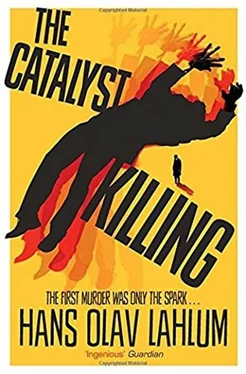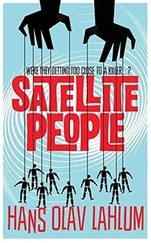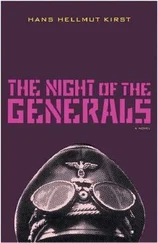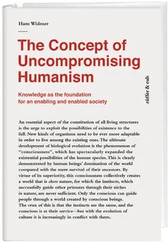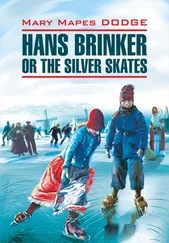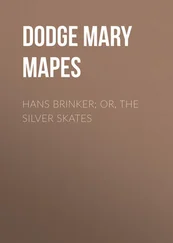But, unfortunately, he was right: at present, there was nothing whatsoever to link him to Falko Reinhardt’s disappearance, and any connection to the murder of Marie Morgenstierne was even more tenuous.
I did, however, take care to note that he did not have an alibi for the evening of the murder, and that he had a walking stick standing out in the hallway.
‘Age takes its toll, even for an Aryan,’ he remarked bitterly, when he saw me looking at the walking stick.
We parted a few moments later without either of us feeling the need to shake hands.
It was half past four when I got back to the office. There was a message lying there to say that the head of the police security service had gone home for the day and would be out on a secret mission the following day. If it was in connection with the murder investigation, however, he could give me fifteen minutes at the end of the day tomorrow, at six o’clock, to be precise.
I immediately confirmed this arrangement and silently hoped that the case would somehow resolve itself one way or another in the meantime. The last thing I wanted was a conflict of interest with the head of the police security service.
My last task for the official working day could be completed with the help of a telephone. It was answered by Astrid Reinhardt, at home in Grünerløkka, after the second ring. She was able to tell me straight away that her son’s passport had not been found, but that they did not in fact know where he had kept it before he disappeared. She added pointedly that the family did have a tradition of keeping their passports in secret places.
Her son’s post office savings book had been left in his bedroom. There was seven thousand kroner in the account. He had withdrawn a couple of thousand three months before his disappearance, but they had no idea what he had used it for. His parents had at first hoped that the withdrawal was an indication that he was alive somewhere else. But this hope dwindled as time passed, and now they thought that perhaps the withdrawal of the money had absolutely nothing to do with his disappearance. He might have wanted to give the money to a political cause or a friend in need, his mother said. Both would have been typical of him, she added, her voice filled with maternal pride.
I thanked her for her help, and promised to call them immediately should anything new be discovered.
At five o’clock the calm of my office was disturbed by a knock at the door.
The pathologist was standing outside, once again looking slightly abashed.
‘You may perhaps have suspected this already, but I have just discovered something concerning the late Marie Morgenstierne that I thought you should know immediately,’ he said.
I indicated impatiently that he should continue. But his previous visit had obviously made him more cautious.
‘First of all I concentrated on the bullet wound in her chest, which was clearly the cause of death. The rest of her body was so badly injured that it was not easy to examine. But I have finished the autopsy now. And there is no doubt that when she died she was…’
He looked at me questioningly. I gave an irritated shrug. There was a flash of triumphant relief in his eyes when he carried on.
‘Pregnant! Very early stages, possibly no more than the fourth or fifth week. And we can’t be sure that she even knew herself, though she may have noticed something. Whatever the case, Marie Morgenstierne was expecting a baby when she died. And I presume that that is of interest to the investigation?’
I nodded, and told him truthfully that I had had no idea and that it was definitely of potential interest to the investigation. He seemed very pleased that he had been able to contribute something, and shook my hand with feeling.
Once the pathologist had closed the door behind him, I sat down to spend the next half an hour writing a report for my boss. It was quick enough to give an account of the day’s events, but developments in the case were slower. It was with great relief that I popped the report into my boss’s pigeonhole at ten to six, then got into my car to drive to Erling Skjalgsson’s Street.
‘So, who posted the threatening letter to Marie Morgenstierne? Trond Ibsen? Kristine Larsen? Anders Pettersen?
Or one of Falko Reinhardt’s parents?’
Patricia helped herself to a piece of salmon, and smiled briefly.
‘Possibly all five of them. But it could in theory have been a lot of other people too. Miriam Filtvedt Bentsen, for example, whom I do not think we should let out of our sight quite yet. Or Falko Reinhardt himself, if he is, as I believe, still sneaking around out there. Or some completely unknown person who, for some reason or another, planned to kill Marie Morgenstierne, and wanted to confuse us by making it look as though Falko Reinhardt’s family and closest friends were to blame. The latter is less likely, but still possible. And furthermore, the murderer does not necessarily need to be the person who wrote the letter. Murders in open spaces can be complicated things.’
Patricia did not look as though she was particularly worried and, with a smile, she started to eat her salmon.
‘You mean, for example, that the murderer may also be the father of her unborn child?’
Patricia nodded.
‘Perhaps, yes. As for who the father might be, it would be natural to assume that it might be one of the others in the group, but it is also possible that she had been sleeping with a fellow student on the quiet, or had a fling with some passer-by who we know nothing about. Whatever the case, we have two alternatives that are both very interesting. Either Marie Morgenstierne had recently been unfaithful to her absent fiancé, or her absent fiancé has been in the area again.’
‘What about the Nazi network lead?’
Patricia nodded.
‘It could mean everything – or nothing. You should also try to talk to this Henry Alfred Lien, even though it’s a slightly longer trip, and even though he does not appear to be very communicative.’
I nodded in agreement.
‘Well, it looks like I may not be able to get much done in Oslo tomorrow, so I had wondered about a day trip to Valdres, both to speak to Henry Alfred Lien and to have a look at the cabin. What do you think?’
Patricia helped herself to another piece of salmon.
‘I think it might be worthwhile. Then we can perhaps solve the mystery of how Falko Reinhardt managed to leave the cabin. The first theory that has to be checked is the window. If Miriam Filtvedt Bentsen is right and the window was too small for Falko Reinhardt to get out of, then we are left with two alternatives, as far as I can see.’
She fell silent and chewed thoughtfully on a mouthful of salmon.
‘And would you perhaps like to share what these two alternatives might be?’
Patricia’s smile was sugar-sweet.
‘Of course. I apologize, but I thought that would be quite obvious to you too. Falko could have sneaked out down the hall. But given that the door to the next room was ajar, and both the people who were in there were awake, the theory doesn’t quite work unless Miriam Filtvedt Bentsen and Kristine Larsen are both lying to cover for him – which is not entirely unfeasible. If they are not, though, that leaves only one possibility, and it is the one that I have always thought to be true.’
Patricia was obviously still more than happy to make fun of me. She demonstratively refrained from saying anything more until I asked.
‘So, according to this theory, how did Falko Reinhardt leave the cabin without the other five noticing, if he used neither the window nor the door?’
Her smile was teasing and she was clearly enjoying the situation.
Читать дальше
